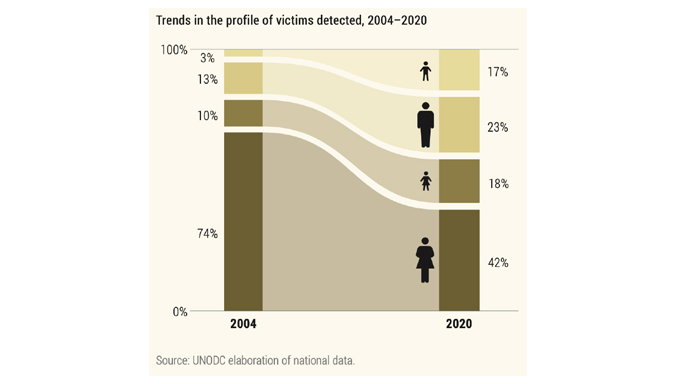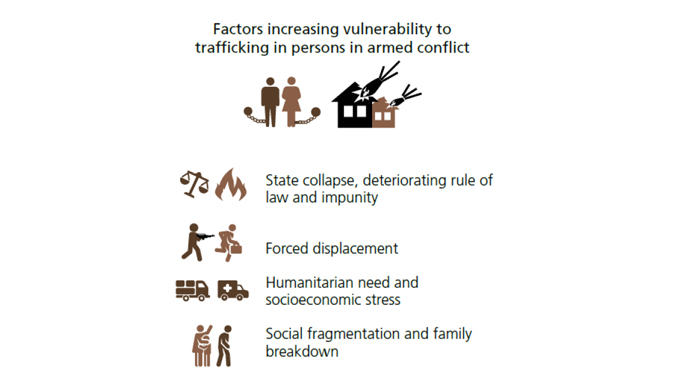Deep Dive Recap: Combatting Trafficking in Human Beings and the Gender Perspective
On the 17th of February 2023, the International Military Staff (IMS) Gender Advisor, Lieutenant Colonel Katherine Prudhoe and staff hosted their monthly Deep Dive Session discussing the relevancy of the gender perspective in combatting trafficking of human beings (CTHB) as one of the five policy areas covered by NATO’s approach to human security to be integrated into NATO’s core tasks. Over 70 participants joined in, both in person and online.

Ms. Maisie Biggs, a Consultant Researcher in Modern Slavery and Human Trafficking International, defined human trafficking as the action (recruitment, transportation, transfer, harbouring or receipts of persons) by means of threat or use of force or other forms of coercion as a position of vulnerability for the purpose of exploitation. The gender perspective of human trafficking become apparent when analysing the different types of trafficking. The force commercial sexual exploitation is 78% female while the total number of forced labour is 57% male. Overall, the total percentage for modern slavery is 54% female. Ms. Biggs noted that more men and boys have been detected in greater numbers over the past decade with only 16% being identified in 2004 to 30% in 2020. Ms. Biggs noted that “gender inequality and discrimination against women and girls increases their vulnerability and risk of trafficking and exposition therefore the responses must address these wider societal issues”.

Using the example of Ukraine, she highlighted that the incidence of trafficking among Ukrainian refugees is relatively low due to visa-free travel and temporary protection statue together with the extensive anti-trafficking measures have effectively mitigated the risks of trafficking of persons in this context. Human trafficking exacerbates conflict itself, undermine efforts at peacekeeping, and inhibits the transition from conflict to stabilisation. Therefore, Ms Biggs mentioned that the relevance for NATO is that trafficking as an immediate threat to military operations and long term stabilisation, that trafficking as a predictable outcome of upheaval which needs to be countered and monitored, and to identify possible exploitation supply chains and procurement.
The next presenter was Major Adriano Fabio Castellari who is the gender focal point from NATO Stability Policing Centre of Excellence. Stability policing focuses on police related activities intended to reinforce or temporarily replace indigenous police forces in or to contribute to the restoration and or upholding of public order and security, rule of law, and protection of human rights. They support before the conflict with conflict prevention, during the conflict with ensuring freedom of movement, and after the conflict with substitution or reinforcement missions. Maj. Castellari noted that stability policing is absolutely devoted to improving the general condition of the host nation’s population with a gender sensitive approach. In order to understand the different security perceptions and needs of men, women, boys and girls at the right time to know who may be at the most risk for what. Maj. Castellari stressed that only with the right information, understanding, and trust can stability policing provide the right protection and security. Integrating a gender perspective for human trafficking would allow forces to collect human intelligence, increase situational awareness, establish a safe and secure environment, and prevent and fight human trafficking. He noted that the trafficking engine can only be challenged by legitimate and credible institutions capable to prevent, protect and prosecute such as the police. If there is trust in the police by the host nation, one will be able to find out when people are going missing and serve as an early warning indicator for possible future conflict.

The final speaker was Mr. Tom Gooch who is a Humanitarian Affairs Advisor for Allied Command Operations. For NATO, he noted combatting trafficking in human beings was considered in policy documents such as the 2004 NATO Guidelines on CTHB in NATO Operations and integrated in to various other doctrinal documents. There is the risk that trafficking in human beings can impact the credibility and legitimacy of NATO led operations, efforts to increase stability and long term peace, as well as the integrity and safety of soldiers on the ground. He discussed that the challenges of the cross cutting topics for NATO, such as combatting trafficking in human beings, is finding the best way to inform our forces on these topics. Mr. Gooch highlight that the “modern battle field is more complex than it has been in the past due to increased technology and identification of new problems that we have to be as clear and concise as possible at the strategic level in order to be successful on the tactile level”. Armed forces must reinforce NATO led efforts to prevent and combat human trafficking, as well as support the commitments by international organisations. He recommended streamlining education and training for the command structure through pre-deployment training to that all soldiers will have the critical ability to identify human trafficking.
Trafficking in human beings is considered a grave human rights violation that impacts men, women, boys and girls differently. Human trafficking can lead to systematic undermining of government and NATO endeavours including threating the success of a military operation and activity. Internally, combatting trafficking of human beings is a common effort and depends strongly on the engagement of all relevant entities and every staff member. Therefore, the implementation of a zero-tolerance policy is a cross-functional duty. Externally, while combatting trafficking in human beings is not a primary responsibility of the military, they can act as witnesses to enabling and facilitating role in establishing cooperation and exchanging information with civilian agencies and entities in charge of combating trafficking. As well, expertise of NATO troops is to be used possible. Stability policing units might be specifically trained to deal with situations of trafficking.
